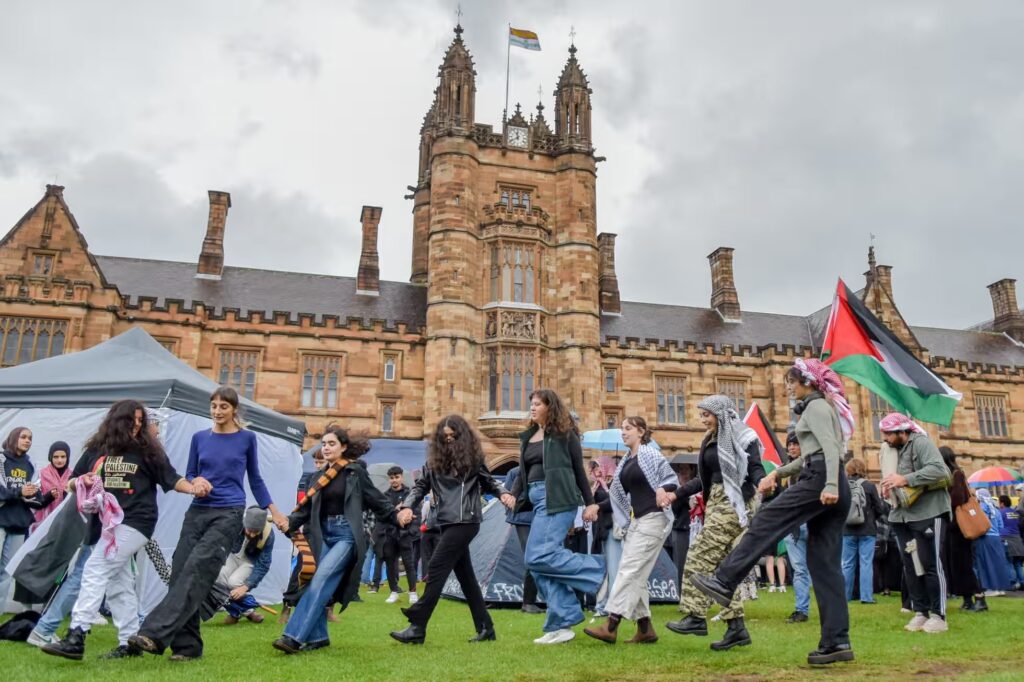Australia/Israel Review
The Last Word: What is a university?
Jul 4, 2024 | Rabbi Ralph Genende

The word university is derived from Latin universitas magistrorum et scholarium, which roughly means a community of teachers and scholars. In this sense, it is closely aligned to the purpose of Judaism’s highest place of learning, the yeshiva. Both are intended to be places that increase knowledge, revere scholarship and respect teachers. Study for its own sake and not for an ulterior motive is one of the most highly prized virtues in Judaism.
Hillel, the great Talmudic teacher, warned against using the Torah as a personal crown to magnify oneself or as a spade or tool to exploit for one’s own power or self-aggrandisement.
The ideal of a university was to be part of a community of scholars and to immerse oneself in the intellectual traditions of humanity. As Abba Eban, fabled Foreign Minister of Israel and a graduate of Cambridge, once quipped while speaking there: “It was here that I learned the integrity, honesty and love of truth… that have been such a disadvantage to me in my political career!”
From Socrates to Eban, Abraham to Hillel, the hallmark of enlightened literacy has always been the willingness to engage in critical scrutiny, to wrestle with ideas that challenge and to feel enlarged rather than alarmed by opposing concepts.
Over the past few decades, these noble ideals and aspirations have been diminished if not abandoned. It can perhaps be traced back to the commodification of education – a degree is no longer a sign of excellence but a ticket to a better job and salary.
Crass commercialisation was accompanied by another trend, what authors Greg Lukianoff and Jonathan Haidt refer to as the “coddling of the mind” – a vocabulary of identity politics that dumbs down education and diminishes the principles that have sustained Western democracy, such as recognition and tolerance of difference as a way of protecting the freedom of all. Instead, our universities have created a culture of grievance, resentment and rage – fertile ground for the kind of vituperative antisemitism we are increasingly witnessing.
The late Rabbi Jonathan Sacks warned about this trend in his final book, Morality. Such grievance culture, he said, turns difference into exclusion and suspicion; it builds walls, not bridges. It abdicates the hard work of understanding, respecting and working with and for people who are not like us. The preoccupation with exclusionary identities, deplatforming, safe spaces and microaggressions has ironically decreased the secure spaces for Jewish students and indeed increased aggression against them.
It has also addled the minds of the university administrators.
What we are witnessing on today’s Australian campuses is a shameful failure of leadership. It boggles the mind how a learned man like Sydney University Vice-Chancellor Mark Scott can engage in such tortured logic to justify the failure of his institution to live up to the purpose of the university in his dealings with anti-Israel protestors who have occupied his university’s campus. These ideals include teaching about morality rather than power and encouraging a multiplicity of ideas and voices rather than favouring one group.
Like some Ivy League presidents in the USA, he and our other prized university leaders in Australia have become purveyors of poisoned ivy – pandering to protestors of shady and dubious intent such as the Islamist extremist group Hizb ut-Tahrir.
Nobel laureate in literature Herta Müller recently lamented that, after spending 30 years under a dictatorship, she thought that only in a dictatorship were people systematically dumbed down by a system in which thinking is forbidden. “I am horrified,” she says, “that young people and students in the West in particular are so confused that they are no longer aware of their freedom [and] seem to have lost the ability to distinguish between democracy and dictatorship.”
Judaism has always championed a diversity of opinion. “These and these opinions count” is a leitmotif of the Talmud. That’s a timely lesson for our universities!
Tags: Antisemitism, Australia, campus protests






